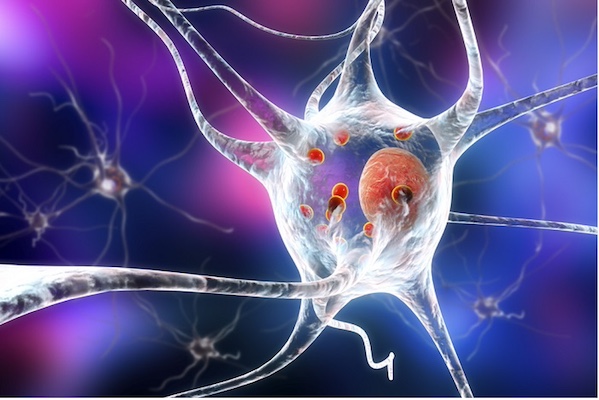AI-Powered Blood Test Predicts Parkinson’s Seven Years before Symptoms Appear
June 25, 2024
Source: drugdu
 513
513
 Parkinson’s disease is currently the fastest-growing neurodegenerative disorder worldwide, affecting nearly 10 million people globally. It is a progressive disease caused by the deterioration and death of nerve cells in a part of the brain known as the substantia nigra, which is essential for movement control. These nerve cells diminish or become damaged, losing their ability to produce a crucial chemical, dopamine, often due to the accumulation of a protein called alpha-synuclein. Presently, treatments for people with Parkinson’s, such as dopamine replacement therapy, are initiated after symptoms like tremors, slow movements, gait issues, and memory problems have already appeared. However, there is a consensus among researchers that early prediction and diagnosis could lead to discoveries of treatments capable of slowing or halting the progression of Parkinson’s by protecting dopamine-producing brain cells. Now, a simple blood test employing artificial intelligence (AI) can predict the onset of Parkinson’s up to seven years before symptoms appear.
Parkinson’s disease is currently the fastest-growing neurodegenerative disorder worldwide, affecting nearly 10 million people globally. It is a progressive disease caused by the deterioration and death of nerve cells in a part of the brain known as the substantia nigra, which is essential for movement control. These nerve cells diminish or become damaged, losing their ability to produce a crucial chemical, dopamine, often due to the accumulation of a protein called alpha-synuclein. Presently, treatments for people with Parkinson’s, such as dopamine replacement therapy, are initiated after symptoms like tremors, slow movements, gait issues, and memory problems have already appeared. However, there is a consensus among researchers that early prediction and diagnosis could lead to discoveries of treatments capable of slowing or halting the progression of Parkinson’s by protecting dopamine-producing brain cells. Now, a simple blood test employing artificial intelligence (AI) can predict the onset of Parkinson’s up to seven years before symptoms appear.
A team of researchers, led by scientists at University College London (UCL, London, UK) and University Medical Center Goettingen (Goettingen, Germany), utilized a branch of AI known as machine learning to analyze a panel of eight blood-based biomarkers, which change in concentration in patients with Parkinson’s, achieving a diagnosis with 100% accuracy. The research team extended their study to assess whether this test could also predict the likelihood of developing Parkinson’s. They did this by analyzing blood samples from 72 patients with Rapid Eye Movement Behavior Disorder (iRBD), a condition where patients act out their dreams, often vividly or violently, without being aware. It is recognized that approximately 75-80% of individuals with iRBD will eventually develop a synucleinopathy—including Parkinson’s—due to the abnormal buildup of alpha-synuclein.
The application of the machine learning tool to these patients’ blood samples revealed that 79% of the iRBD patients had biomarker profiles similar to those diagnosed with Parkinson’s. These patients were monitored over a decade, and the AI’s predictions so far align with the actual rate of clinical progression, with the team successfully identifying 16 patients who would go on to develop Parkinson’s, up to seven years before any symptoms emerged. researchers are continuing to track these patients to further validate the accuracy of this predictive test.
"By determining 8 proteins in the blood, we can identify potential Parkinson's patients several years in advance. This means that drug therapies could potentially be given at an earlier stage, which could possibly slow down disease progression or even prevent it from occurring,” said Dr Michael Bartl from University Medical Center Goettingen who conducted the research from the clinical side. “We have not only developed a test, but can diagnose the disease based on markers that are directly linked to processes such as inflammation and degradation of non-functional proteins. So these markers represent possible targets for new drug treatments.” The research team's findings were published in Nature Communications on June 18, 2024.
Source:
https://www.labmedica.com/molecular-diagnostics/articles/294801612/ai-powered-blood-test-predicts-parkinsons-seven-years-before-symptoms-appear.html
Read more on
- China Sino Biopharmaceutical Signs Exclusive Licensing Agreement with Sanofi for Rofalcitinib March 4, 2026
- Gan & Lee Pharmaceuticals’ new PROTAC drug GLR2037 tablets have been approved for clinical trials to enter the field of prostate cancer treatment March 3, 2026
- AideaPharmaceuticals plans to raise no more than 1.277 billion yuan through a private placement to focus on the global clinical development of innovative HIV drugs March 3, 2026
- Giant Exits! Its Star Business Acquired March 3, 2026
- Focusing on cardiovascular and cerebrovascular diseases! OpenMediLead Medical Intelligence Dual Engines Launch Internal Testing, Connecting Drug Development and Clinical Diagnosis in a Closed Loop March 3, 2026
your submission has already been received.
OK
Subscribe
Please enter a valid Email address!
Submit
The most relevant industry news & insight will be sent to you every two weeks.



